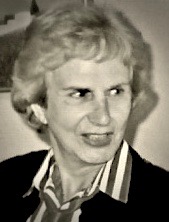Odile Baron Supervielle
 From Wikipedia the free encyclopedia
From Wikipedia the free encyclopedia

Odile Baron Supervielle (May 1, 1915 – October 25, 2016) was an Uruguayan-born Argentine writer and journalist. A pioneer of women journalists in Argentina, she was director of the literary supplement of the newspaper La Nación.
Biography
[edit]Odile Baron Supervielle was born in Montevideo, Uruguay, May 1, 1915. She was the fourth of the six children of the French banker Etienne Baron Lamothe and the Uruguayan Ana Supervielle Munyo. Odile's siblings were Santiago, Andrés, Victoria, Susana and Colette.[1] She is the niece and goddaughter of Jules Supervielle.[2] Other relations include: Susana Baron Supervielle, Ana Baron Supervielle, Silvia Baron Supervielle, Gloria Alcorta, and Oliverio Girondo.
Baron Supervielle was a writer and journalist for the daily La Nación, La Prensa,[3] and other publications.[4] She contributed to various South American and European publications. She interviewed personalities of Argentine and European culture and science, such as Jorge Luis Borges, Julio Cortázar, Adolfo Bioy Casares, Pablo Neruda, André Malraux, Manuel Mujica Lainez, Eduardo Mallea, Ernesto Sabato, Francois Truffaut, Edgardo Cozarinsky, Leopoldo Marechal, Jean Hamburger, Susan Sontag, Françoise Héritier, Abate Pierre, María Rosa Gallo, Alberto Girri, Juan Carlos Paz, Marguerite Duras, Jorge Semprún, Astor Piazzolla, Miguel Ocampo, Jorge de la Vega, Sebastian Spreng, Jean-Gilles de Gènes, and Salvador Dalí.[5][6][7][8] The digitized archive of her interviews is held in a collection at Villa Ocampo.[9]
In 1970, with Silvia Ambrosini and Germaine Derbecq, she co-founded ARTINF magazine.[10] In 2002, Baron Supervielle published Alberti en Buenos Aires.
Odile Baron Supervielle died in Buenos Aires, October 25, 2016.[11]
Awards and honours
[edit]In 1999, Baron Supervielle was awarded the Enrique Fernández Latour Prize for Argentine-French friendship in criticism and dissemination.[12]
References
[edit]- ^ Maugey, Axel (1 January 1999). LES ELITES ARGENTINES ET LA FRANCE (in French). Editions L'Harmattan. p. 88. ISBN 978-2-296-37507-9. Retrieved 3 September 2021.
- ^ "Revista Intramuros". www.grupointramuros.com. Retrieved 3 September 2021.
- ^ "Victoria Ocampo en francés - Cultura". Diario La Prensa. 6 October 2014. Archived from the original on 2014-10-06. Retrieved 4 September 2021.
- ^ "Baron Supervielle, Odile - Catálogo Acceder". 26 October 2012. Archived from the original on 2012-10-26. Retrieved 4 September 2021.
- ^ Thiher, A. (1984). "Review of Figures: Essai sur un miroir, Anne Théron". World Literature Today. 58 (2): 240. doi:10.2307/40139979. ISSN 0196-3570. JSTOR 40139979. Retrieved 4 September 2021.
- ^ "El último secreto de Malraux"
- ^ "Páginas luminosas: Censura, libertad y disentimiento - CENTROAMERICA21.COM". 2 June 2008. Archived from the original on 2008-06-02. Retrieved 4 September 2021.
- ^ "Salvador Dalí siempre es noticia". www.laprensa.com.ar. 21 December 2008. Retrieved 4 September 2021.
- ^ "Odile Baron Supervielle". Villa Ocampo. 6 October 2014. Archived from the original on 2014-10-06. Retrieved 4 September 2021.
- ^ "bibliografia2". www.arteuna.com. Retrieved 4 September 2021.
- ^ "Odile Baron Supervielle: periodista cultural de varias orillas". La Nación (in Spanish). 30 October 2016. Retrieved 3 September 2021.
- ^ "institución Ferlabó". 28 September 2009. Archived from the original on 2009-09-28. Retrieved 4 September 2021.